SLS Moments
Unforgettable Faculty
Characters with Character
I will always remember Mark Kelman (Criminal Law) — then the young radical of the faculty, now the vice dean — for making the case that the criminal law apparatus (and perhaps the entire legal system) was an emperor with no clothes… Byron Sher (Contracts) — gentlemanly to the core… Bill Cohen (Torts) – succinct, even terse, with a razor-sharp mind and wit. Charlie Meyers (Property) – a colorful character with a big personality; direct, hard-driving, charismatic… Gerald Gunther (Constitutional Law) – erudite, nuanced, discerning, broad-minded. He held court on issues of the day and reminisced about Learned Hand… John Kaplan (Evidence) – insightful and highly entertaining, with a puckish sense of humor… Wayne Barnett (Tax) – for his infectious enthusiasm. He treated a court’s flawed decision with the incredulity of an ardent sports fan reacting to a referee’s bad call.
A Message from Mom
During our graduation ceremony, Professor Barbara Fried read from responses to a questionnaire she had surreptitiously sent to our families. Although she read them anonymously, I spotted my mother’s response to one question — “What surprised you about your child’s Stanford experience?”— right away. She had written back, “I’m surprised that my child is moving back east after three years on the West Coast with no new tattoos or piercings.” Our graduation day was such a happy and celebratory occasion, and I was grateful to Professor Fried for how she personalized it.
Role Model for a Fish Out of Water
When I arrived at Stanford Law in the fall of 1985, I was privileged to be in Professor Mendez’s first-year criminal law class. It was particularly significant (and somewhat shocking) to me to have a Latino professor, and Mendez did not disappoint. His eloquent lecture style was a pleasure to behold. He moved about the classroom with cat-like grace, and his resonant voice made you want to listen. You could just imagine him standing before the jury, brilliantly pleading for his client. He was a magnificent role model for a young Latino law student who mostly felt like a fish out of water at Stanford, and his class sparked in me what would turn out to be a lifelong interest in criminal law and procedure.
Welcome to Trimble City
I was and am still inspired by Professor Hank Greely, who joined the faculty in 1985, the same year our class entered SLS. We all attended his class on real property law. I expect all of my classmates will remember the many practical lessons in legal issues encountered during property transactions, which culminated in an interactive exercise that had the entire class assigned roles within an imaginary town. That town was ultimately renamed Trimble City after our classmate Elizabeth Trimble ‘88, who in her role as the town’s wealthiest citizen donated a significant portion of her wealth to save the town from being assessed higher property taxes.
Bigger than a Brand
One of my favorite memories, and a story I often tell others, is that of Professor Lawrence Friedman sharing his wit with the class. I was always tickled by his sardonic references to our East Coast competitors as “Brand H” and “Brand Y.” Blessings to my classmates, and a hearty happy 125th anniversary to SLS, a law school so individualistic that no one could ever call it “Brand S!”
Civil Litigation by the Libretto
I always loved Jack Friedenthaler’s Civil Procedure class the morning after he attended the opera. He would start the class by describing the opera through the lens of civil litigation. Sparring lovers might be viewed as involved in a domestic relations case. A murder provided a potential wrongful death case.
Favorite Courses, Fond Memories
My favorite memories of Stanford Law School include property law with Carol Rose, labor law with Bill Gould, constitutional law with Paul Brest, criminal law with Tony Amsterdam, and history of American law with Lawrence Freidman; growing the Stanford Public Interest Law Foundation; working with classmates Bebo Andrews ‘81 and Marie Sansone ‘81 in the Environmental Law Society; serving as a grad student resident in an undergrad residence hall and fraternity; seeing John Elway play football; whale-watching at Point Reyes; and trips up and down the U.S.
Diverse Perspectives, Distinctive Discourse
A favorite memory for me is the tax course team taught by Martin D. Ginsburg (husband of Justice Ruth Bader Ginsburg), one of the best corporate tax lawyers in the country, who was then a visiting professor, and Mark Kelman, a “radical” scholar of law and economics who is now vice dean. The two professors clearly respected and liked each other, using the tension in their diverse perspectives to bring out the best intellectual discourse of any class I attended at Stanford.
Encouragement from a Hero
I entered SLS in 1972 as one of few women students and even fewer African-American students. Although I had done very well academically in school and on the LSAT, I was nervous and unsure of myself. Thank goodness for Assistant Dean Thelton Henderson. He welcomed me, assured me that I belonged and would do fine, and consistently provided ongoing encouragement and support throughout my time at SLS. Dean Henderson was my hero then and remains a hero to me now.
No Dogs Allowed
My purpose in going to law school was to use the law as a substantive foundation and training to achieve public policy goals related to poverty and inequality — my career focus for the last almost 45 years. I did think about practicing but, like the flu, got over it. My SLS recollections include serving as lead U.S. Senate staffer for former Dean Tom Ehrlich’s confirmation hearings as the first president of the newly formed Legal Services Corporation (LSC). I then saw firsthand the superb job Ehrlich did as LSC’s first president — this despite the fact that my interaction with the dean at SLS was limited to his enforcing the rule prohibiting my dog from attending classes.
A Mother’s Pride
My lasting memory from our first year at SLS was Paul Brest’s small section of Criminal Law —in particular, the day Brest’s mother came to class to see her son in his first year of teaching at Stanford!
How Times Have Changed
In Professor Moffatt Hancock’s real property class, I raised my hand to ask a legitimate and incisive question. After hearing me out, my favorite professor bellowed, “Mr. Schtall” (which made me think my family had been mispronouncing our name for hundreds of years), “I am not standing up here in order to field your foul balls.” Oy vey, but a great line. I used it later myself in depositions when the deponent had the temerity to ask me a question. But I had a smile on my face during delivery.
Red Hot Law Professors
In the 1960s, two Stanford Law professors — Moffatt Hancock in 1961 and Charles Meyers in 1963 — won Stanford’s Red Hot Professors election. The winner would lead the “give ‘em the ax” cheer at Big Game. An article by the Stanford Historical Society describes Hancock as known for his “congeniality,” but that certainly did not describe our classroom experiences with him.
Always Prepared
I remember when Professor Shepherd, at the end of our first-year contracts class, expressed gratitude for the fact that no one had ever been unprepared in class. It was the last class he taught at Stanford before retiring. We so admired and respected him that there was no way we would have gone to class unprepared. He remarked that our class included two members whose parents had been his students decades earlier. One was John Hurlbut, and the other was me. My father remembered him all those years later with great fondness.
Question Everything
My fond memories of Stanford law include a remark from Professor Baxter, JD ’56, after 10 minutes of lecturing: “I hope there are questions since what I told you is not true.” I also recall studying on the beach at Half Moon Bay in February, going to Stanford Stadium for the football team’s “moral victories,” seeing Mort Sahl and the Limelighters in North Beach, and Moot court –– a true learning experience.
Who Needs Broadway?
What student could fail to remember Professor Moffatt Hancock’s theatrical demonstrations of the rules set down in landmark real property case decisions with Professor Hancock acting out the arguments. From one side of the podium, he would play “Mr. Lash” of the firm Scrooge, Skinner and Lash — aggressively putting forth the winning argument of ‘duly recorded first.’ Racing to the other side, he would impersonate “Mr. Doolittle” of the firm of Dilly, Dally, Doolittle and Stall, weakly responding ‘prior in time.’ He would then sit on the chair behind and above the podium and comically stroke his imaginary judicial beard, pondering his decision before ruling, of course, for Mr. Lash. With Professor Hancock, who needed Broadway?
Grad School — Not Grade School
What Stanford law student could forget Professor Phil Neal’s constitutional law class, with the first week assignment to read the whole U.S. Constitution, or the student outrage at his closed-book quiz. We thought we should be exploring legal theory! After all, this was graduate school, not grade school. But Professor Neal thought Stanford law students should know precisely what the Constitution says and where to find it. The average grade on this quiz was 20 out of a possible 100—a resounding F.
No Laughing Matter
I have thought for a long time about writing an essay on legal humor (not lawyer jokes). One anecdote that stands out involves a code pleading class with Professor Owens. Almost everyone in class had a set of notes taken by Seth Hufstedler ’49 years before. Whenever Owens told a joke, the class roared because there was the joke in the notes in front of them. You could see the professor make a note, probably “still good, use again next year.” Otherwise, law school was not funny.
Great Class, Good Times
My time at Stanford Law School was the best experience in my life, in many ways. There I was exposed to some great teachers. John Hurlbut was my favorite. I became friends for life with some truly fine people — Jack Halpin, Leon Shiells, Bill Rehnquist, Beatrice Challiss Laws, Sandra Day O’Connor, Dave Salisbury, Don Jarvis, Don Lundgren, to name a few. It was, and is, a great class. Those were good times.
SLS Shenanigans
Almost Champions
This is a great shot of our 2L intramural football team, which made it to the All University Finals (and lost).
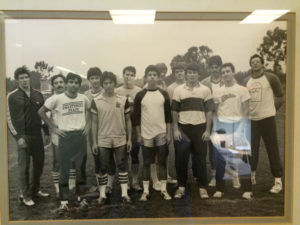
SLS, Start to Finish
These photos of Brian Keating and me at a Stanford football game in Fall 1982 and of Dan Bussel and me at graduation pretty much bracket our three years at the Farm.
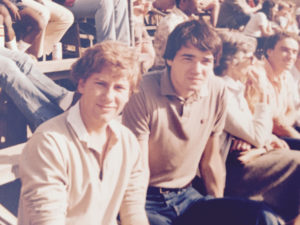
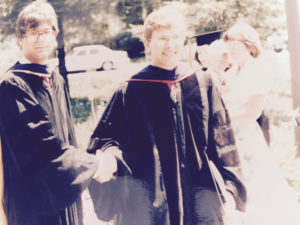
All Aboard the Nimitz
After two years of walking around campus and begging for rides, Dan Cohen and I purchased a car for $225. It might seem like a bargain but it was actually a fair price for a ginormous station wagon with peeling paneling, at least five different colors of bodywork, and horrible gas mileage. We named it after the largest ship in the world, the USS Nimitz. Our rule for other classmates was, “You can use the car as often as you want, but you only get to borrow the key once, so make a copy if you ever want to use it again.” By the end of the year, two or three dozen folks had keys to the Nimitz.
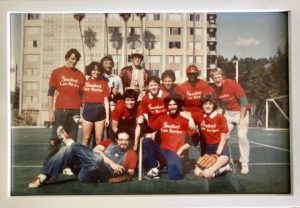
Family Beginnings
My favorite SLS memory is meeting the love of my life at Admitted Students Weekend and starting a family together!
First Quarter Finale
I remember our annual Vegas trips, the SLS musical, and traveling to The Hague for an international criminal justice class. I also loved the sense of community and mutual support in the run-up to our first set of 1L finals. Everyone was stressed out, but still made time to help each other. Capping it all off with that big celebration in the courtyard was the perfect bow on a great first quarter.
First Semester, Last Final
I remember feeling I must have just failed out completely after finishing my last final my first semester, then walking into the waiting line of professors. They ushered us into the cafe area to get our 1 1/2 L shot glasses and then took shots with us. I also remember climbing up on that ugly steel falcon statue to get a picture after my last final 3L year!
Bouquets and Beefeaters
One of my best 1L memories is walking into our small section’s last final of fall semester (Contracts!), seeing four bouquets of flowers taped to the whiteboard and realizing my name was next to one of them. Ben Hernandez-Stern ‘06 had gotten there early to set up the surprise for me and the other members of our study group: Heather Mitchell ‘06, Christin Hill (Munson) ‘06, and Stefanie Alpert (Schneider) ‘06. I also remember winning two pitchers of beer for my Beefeater costume at a Halloween Bar Review. I’m pretty certain I won because the costume was very clearly homemade!
Witnessing “The Play”
Bruce King, Paul Harris, and I traveled to Berkeley third year for the Big Game and ended up witnessing what is still regarded as one of the wackiest finishes in sports history: “The Play.” Cal used five laterals to run back the kickoff with no time on the clock, while the Stanford band ran onto the field and the tuba player got flattened by the Cal player scoring the winning touchdown.
Epic Fail
I realized why none of my classmates was ever going to attend Cal Tech when we attempted to convert the upstairs shower in Crothers Hall into a hot tub. In case you don’t remember how that turned out, it was an epic fail!
Wisdom or Shoe Golf?
What are we supposed to recollect for SLS 125? Wisdom from the faculty? Or timeless moments like Steve Scharf ‘74 and John Fulham ’74 playing shoe golf?
An Awkward Silence Broken
Forty-five years ago, a group (you know who you are) attended a dinner at our humble Escondido Village apartment. All watched with dismay as I mangled the pasta main course. Afterwards, there was awkward silence, finally broken by a toast from Bob Vanderet: “May the Peace in Vietnam stick together as well as Jay’s fettuccine Alfredo.” Alas, it did not.
Adding Women and Veterans
To solve the draft reduction in law school classes, Dan Ellsberg’s wife Patricia — the sister of Jackie Marx Barnett, who was the wife of Wayne Barnett — decided Stanford Law should admit … women! Veterans also were actively recruited, and I have memories of our veteran classmates adding much to SLS discussions during that Viet Nam period.
Learning a “Stanford Rule”
It was the spring of ’59, and I was facing all my exams with one day off in between. When I came out of the first exam, my wife told me our first child had decided to arrive right then, more than a month early. The labor lasted over 30 hours, leaving no time for study or sleep, and the contracts exam was at 8:00 a.m. Miss it and you wait a year. I pleaded my case to Hurlbut and got a “special” dispensation –– start at 10:00 a.m., in his office. I learned a ‘Stanford Rule’ learned on the spot: always be prepared, sleep is not required, 48 hours is a snap –– and get it done! P.S. I got a great grade.
Birth of the Desert Rats
On my first day at Stanford Village, I met Ward Mathews and John Lawrence. Along with our wives (whom we all met at Stanford), we became lifelong friends enjoying virtually every holiday together. Inspired by years of Washington’s Birthday week camping at Anza Borrego, the six of us called ourselves the Desert Rats.
Bungalow Dining
Crothers Hall opened during my first year of law school, so I enjoyed a new one-resident apartment — real luxury. We were not allowed to live at Crothers for three consecutive years, so during my second year, Irving Sulmeyer, Bob Wahrhaftig, Dick Burns, and I shared a bungalow in East Palo Alto. We ate a lot of canned spaghetti. My third year I was back in Crothers.
Home Cooking, Clerk-style
I remember a dinner I cooked in my Washington, DC, apartment for Sam Thurman ’39 and George Osborne, while I was clerking for Justice William O. Douglas at the U.S. Supreme Court. I was the second Stanford Law graduate to clerk at the Court, following Warren Christopher ’49, who also clerked for Justice Douglas. Bill Rehnquist ’52 was the third and clerked for Justice Jackson while I was clerking for Justice Douglas.
Education with Impact
Learning from History
Moffatt Hancock’s class Modern American Legal Thought (MALT) taught the historical use of legal/factual fallacies to develop new legal theories of liability until other legal theories were developed or expanded to justify the new liability. If you take advantage of the new developing theories, you can use them to your advantage, as I did (as long as the judge was willing to buy into it).
Moot Court Memories
I remember organizing the first-ever West Coast Phillip Jessup International Moot Court Competition. It was fantastic meeting teams from all over the world and introducing West Coast attorneys to the joys of being judges. I also remember being the only one to get a perfect score in our first-year moot court arguments. (One judge later told me the panel tried everything to trip me up, but I had an answer for everything!) And I won the O’Melveny & Myers’ first-year moot court briefs competition; out of 50 moot briefs submitted from law schools from across California, O’Melveny chose three, and mine was one of them!
Rising to the Challenge
Here is a photograph of the members of SLS’s Bhutan Law and Policy Project ascending to Tiger’s Nest Monastery in Paro, Bhutan. It was taken during our country visit in March 2012, as we prepared a two-volume textbook on the laws of the fascinating Buddhist kingdom. It was a deeply affecting journey undertaken with great friends. Tashi delek!
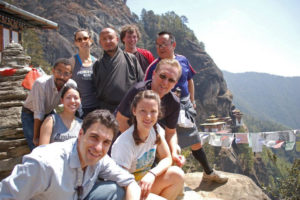
Leading the Antitrust Revolution
I’m packing my briefcase for a trip to Tokyo, thinking about all the ways SLS prepared me for this interesting consulting opportunity. Bill Baxter ’56 got me hooked on antitrust, then revolutionized the field with worldwide implications. As I moved from private practice to in-house work, I saw and understood his influence here in the United States and in the EU when I worked there, and even in Japan just before my retirement.
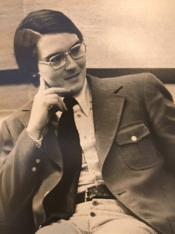
A Transformative Example
Kourtney Perry (James) ’05 and the women of the Black Law School Association Class of 2005 served as an inspiration to so many of us in the Class of 2006 by pulling together and creating the first BLSA annual conference at SLS in years. If you recall, that was the class without a single black man, and the women joined together to truly transform the strength of BLSA in a way that was obvious both internally and externally.
Committed to Positive Change
SLS means commitment. I learned to commit…
to hard work,
to social justice,
to high standards,
to having difficult conversations,
to balancing out work and play,
to being there for those in need,
to using our privileged positions for positive change.
Before the Tech Tidal Wave
Our class was one of the last to graduate in the pre-internet, pre-cell phone era, which now seems as distant as the Pleistocene. We got a first-rate legal education, but I can’t remember a single course that anticipated the technological tidal wave to come. (I loved my copyright course, but it was about books printed on paper, for God’s sake). In spring semester of my third year, I shared a house with a computer science grad student, and I remember a conversation at our kitchen table when he told me about work he was doing on something called ARPANET. I had no idea what he was talking about. If I had listened more carefully, maybe I would have become a zillionaire.
Memories and Gratitude
I remember leaving the law library at closing and walking through blankets of thick fog amid fragrant eucalyptus trees… cherished day trips with friends to San Francisco, Napa, and Half Moon Bay… discovering that I liked tax, securities, and corporate law… witty notes left in our law school mailboxes… returning to campus for graduation while focused on studying for and worrying about the looming bar exam… enjoying a successful and interesting law practice… being able to use my legal education and experience to do pro bono work for community organizations, especially animal welfare and rescue charities. Decades of appreciation for being able to attend Stanford Law School!
Before and After
My first year at law school was the most broadening intellectual experience ever! There was definitely a difference in my intellectual maturity and openness before and after first year. Thank you SLS!
The Perils of Lawyerly Thinking
The first day of law school in 1969, then-dean Bayless Manning told our assembled class that somehow in the coming three years we would all come “to think like lawyers.” He went on to mention that it was not completely clear what would cause this to happen, but it would. Sometime during law school, my wife complained about a very rude grocery store checkout clerk. When I told her to look at the situation from the grocery clerk’s point of view, she interrupted me to say: “Can’t you ever stop thinking like a lawyer? All I wanted was sympathy, not analysis.” I think Bayless was on to something.
An Expanded World View
Although I chose the Foreign Service, as my career, after two years of teaching in West Africa and two years of law practice in Denver, three years of SLS had a profound impact on my intellectual and professional development. My professors made a deep impression on my views of the world, and the discipline and precision they taught were invaluable in a diverse career in foreign policy and diplomacy.
Inspired to Poetry
Upon graduation from the law school in 1961 I took the Arizona Bar Exam. The night before the exam, I wrote this poem incorporating many ideas about the law I learned at Stanford:
“Twas the night before bar exam
When there in my room
I studied some water law
What is a flume?
The other examinees were snug in their beds
While visions of counterclaims danced through their heads.
When out on the terrace there arose such a clatter
I slid back the door to see what was the matter.
A gentleman stepped from a red puff of smoke,
And I knew in a minute it must be Lord Coke.
‘Ad coelum,’ he spake. ‘No more!’ I did say.
‘Your dictum deceased with the FAA.’
‘Damnum absque injuria,’ he said,
As he tilted his wig, whereupon I pled:
‘Give me some rules for the test I implore,
And as long as you’re at it, the reasons therefore,
On conflicts, on contracts, on close corporations,
On tortious intrusions, on contract relations.’
‘I cannot,’ he shrieked, ‘There are no more rules.
The laws are mere sociological tools.
To restore the law I would sue in tort
For its misrepresentation by the Supreme Court.
But, alas, I must watch from the coelum above
While they merge it with equity like a labor of love.
Of late, they will not even lend a hand
To a covenant running along with the land.’
I interjected they have also been rude
With a discriminating equitable servitude.
‘Which shows,’ he replied, ‘that the rules are dead.
So don’t even bother to clutter your head.’
‘Thanks,’ I rejoined, ‘I will take your advice.’
(But I better not be examined twice.)
With another puff he was off like a star.
I returned to my room to relax for the bar.
But I heard him exclaim ere he left in the night:
‘Happy bar time to all, and to all a good fright!’ ”
